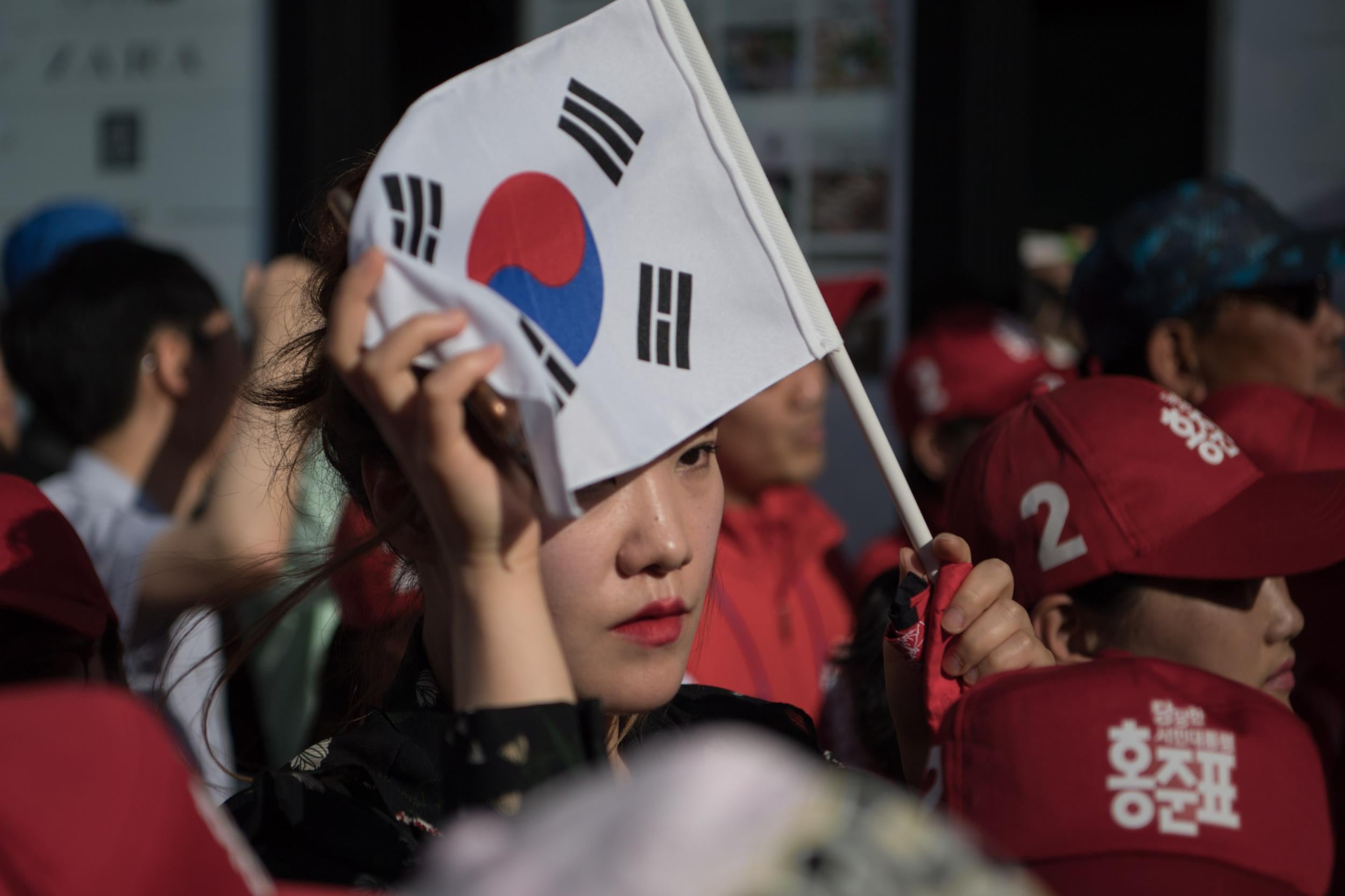South Korea elections 2017: Country goes to poll amid biggest crises in recent history
The economy, North Korea, and Donald Trump are all major issues

Your support helps us to tell the story
From reproductive rights to climate change to Big Tech, The Independent is on the ground when the story is developing. Whether it's investigating the financials of Elon Musk's pro-Trump PAC or producing our latest documentary, 'The A Word', which shines a light on the American women fighting for reproductive rights, we know how important it is to parse out the facts from the messaging.
At such a critical moment in US history, we need reporters on the ground. Your donation allows us to keep sending journalists to speak to both sides of the story.
The Independent is trusted by Americans across the entire political spectrum. And unlike many other quality news outlets, we choose not to lock Americans out of our reporting and analysis with paywalls. We believe quality journalism should be available to everyone, paid for by those who can afford it.
Your support makes all the difference.South Koreans are set to go to the polls amid rising tensions with North Korea, economic inequality, and a previous president who was impeached on corruption charges.
There will be no run-off election based on the two candidates receiving the highest number of votes.
Prime Minister Hwang Kyo-ahn, who took over for former president Park Geun-hye, will not be running in the election.
The election will involve 19 presidential candidates and due to the impeachment of Ms Park, the winner will be determined by a majority vote.
The two front-runners are Moon Jae-in and Ahn Cheol-soo.
Mr Moon is a human rights lawyer and lost to Ms Park in the 2012 election.
Mr Ahn, a doctor and software company executive, is the People’s party nominee, a party he formed in 2014 after previously being in Mr Moon’s party.
The fact that these candidates, both considered politically liberal, are doing well may signal that South Korea is ready to break with the conservative party rule of Ms Park.
Some who are conservatives but did not support Ms Park through the corruption scandal and impeachment have thrown their support behind Mr Ahn, seeing him as a better leader than Mr Moon.
This could be due to Mr Moon’s stance on the hot button issue of North Korea.
Mr Moon’s parents actually fled their homes in the north during the Korean War and advocates for a less hard line approach than the conservative party, which has allowed the US to install the Terminal High Altitude Area Defence (THAAD) missile system and readied the military for a conflict.
He has called for a Sunshine Policy based on cooperation. A similar policy was introduced 20 years ago but failed even after securing multi-billion dollar humanitarian and economic aid package for North Korea.
Mr Moon has said he would like to open an industrial park on the border of the two countries and try to have warmer relations with North Korean leader Kim Jong-un.
Hong Joon-pyo, a presidential candidate for conservative Liberty Korea Party has said Mr Moon is “holding hands with the North.”
Lisa Collins, a fellow with the Korea Chair at the Center for Strategic and International Studies, told The Independent explained that voters over the age of 60 tend to support candidates with a hardline approach to Pyongyang because of history.
These voters grew up in a war-torn country and associate the US with aid, military protection, and economic growth, Ms Collins said.
They also had more “anti-communism education” compared to younger voters and so tend to support the relationship with the US, she explained.
Ms Collins said that many young voters in their 20s tend to support Mr Moon. These voters are more “pragmatic...with a different stance on each type of issue,” said Ms Collins.
They tend to be “more conservative when it comes to North Korea, but are very worried about the economy.”
The Yonhap News Agency reported that the “economic suffering index,” a figure calculated using the unemployment and inflation rates, has hit a five-year high.
Ms Collins noted that Mr Moon’s message on reducing economic inequality also resonated with a younger population that is concerned about jobs and the “rising costs of housing and education.”
The economy is always an issue in every election, Ms Collins said, but it is “highlighted” in this one because of the corruption scandal with Ms Park involved family owned conglomerates, called chaebol, and exposing the underlying corruption of several large corporations in the country.
Mr Moon is also campaigning on reviewing the US-Korea relationship, saying that he would not “take a back seat” when it comes to North Korea but this could also apply to the two parties’ free trade agreement.
Donald Trump has said he thinks is a “a horrible deal” and wants to “terminate or negotiate” it.
Voters in their 40s and 50s tend to support Mr Moon on this stance because they were coming of age in the 1980s as South Korea was democratising and “holding protests against past authoritarian South Korean governments,” Ms Collins said.
Mr Moon was arrested as a university student during such rallies.
Though the trend in the recent US, UK, and French elections has been a split between rural and urban populations, Ms Collins said that is not likely in South Korea.
Instead there will likely be geographical divides along these lines: conservative voters in the eastern parts of the country and liberals in the south and west. Ms Collins said this is due to how the country has developed economically since democratisation.
It is expected for turnout to be massive; some surveys have put participation at 91 per cent of eligible voters in the country.
Join our commenting forum
Join thought-provoking conversations, follow other Independent readers and see their replies
Comments